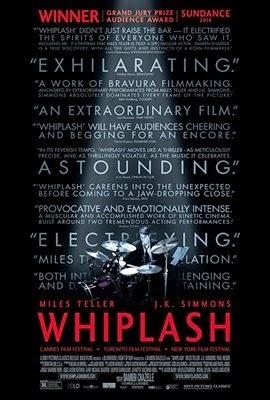
Directed By: Damien Chazelle
Starring: Miles Teller, J.K. Simmons, Melissa Benoist
Tag line: "The road to greatness can take you to the edge"
Trivia: J.K. Simmons suffered two cracked ribs when Miles Teller tackled him during a scene
Of the eight films nominated for Best Picture at this year’s Academy Awards, two were powerful enough to stay with me for days after seeing them. The first was Birdman, the eventual winner, which impressed me with its style and imagination. The second was director Damien Chazelle’s Whiplash, a movie that featured what was easily 2014’s most fascinating character: Terence Fletcher, the often abrasive jazz instructor portrayed by J.K. Simmons, a man whose quest for musical genius was so all-consuming that it transformed him into a monster.
Andrew Niemann (Miles Teller), a first-year student at New York’s Shaffer Conservatory, has one goal in life: to become a great jazz musician. Having played drums since he was a child, Niemann spends hours a day practicing, and, for inspiration, studies the work of famous drummers like Buddy Rich. So when Terence Fletcher (Simmons), conductor of the school’s award-winning jazz program, shows interest in his work and invites him to sit in on his band’s next practice session, Andrew is beside himself with joy. That happiness disappears rather quickly, however, when, during that practice, Fletcher verbally abuses Andrew for not staying in tempo (Fletcher even throws a chair at Andrew’s head). Far from discouraging him, Fletcher’s tirade makes Andrew try harder. He even goes so far as to break things off with his new girlfriend Nicole (Melissa Benoist) so that he can dedicate himself entirely to his craft. His father, Jim (Paul Reiser), is understandably concerned, noting that, since he’s joined Fletcher’s band, Andrew’s attitude and behavior have taken a turn for the worse. For Andrew, though, it’s all about the music, and his desire to become one of the greats motivates him in ways he never before experienced. But will the volatile Fletcher allow Andrew to continue, or will he stifle the poor kid, forcing him to give up on his dreams?
As Andrew, Miles Teller is just about perfect, playing an eager young guy who lives and breathes jazz music. On occasion, he even sheds blood for it (he develops blisters on his hands while practicing a difficult technique). Over the course of the film, we watch Andrew go from a shy young man, too scared to approach the pretty girl working behind the counter at a local movie theater, to a confident, almost cocky jazz musician. Pushing him to his breaking point is Terence Fletcher, so expertly portrayed by J.K. Simmons that the actor walked off with this year’s Oscar for Best Supporting Actor. In Simmons’ hands, Fletcher becomes a rabid dog, spewing obnoxious insults at his students on a daily basis (in one scene, Fletcher throws an overweight trumpet player out of the band for not knowing if he was out of tune). We do occasionally catch a glimpse of his human side; when he learns that a former student of his, Sean Casey, has passed away, a tearful Fletcher pays tribute to him at the next day’s practice session. But for the majority of Whiplash, Terence Fletcher is one mean bastard, and J.K. Simmons brings him convincingly to life.
But it’s not the violent outbursts that make Fletcher such an interesting character; it’s his reasons for doing so. At one point in Whiplash, he tells the story of how jazz legend Charlie Parker, while still a young sax player, screwed up so badly at an audition that drummer Jo Jones threw a cymbal at his head. Humiliated, Parker cried himself to sleep that night. “But the next morning, what does he do?”, asks Fletcher. “He practices”. A year later, Parker played a gig in Reno, during which he performed one of the greatest solos in jazz history. Fletcher believes that, had Jones not thrown the cymbal, Parker would have never had the drive to improve himself. According to Fletcher, if he doesn’t continually push his musicians, he could be depriving the world of “the next Louis Armstrong, the next Charlie Parker”, adding, “That, to me, would be an absolute tragedy”.
It’s hard to condone Terence Fletcher’s behavior in the classroom, where his outbursts often turn ugly (some of his insults were downright homophobic). But while his methods may have been, at best, questionable, his ultimate goal was an admirable one. In this age of sensitivity, where kids are awarded “participant” ribbons whether they win a competition or not, what’s the motivation to improve oneself? If half my best is good enough, why push for more?
As Terence Fletcher put it, “There are no two words in the English language more harmful than ‘good job’”, and by the time Whiplash is over, we know exactly what he means.
